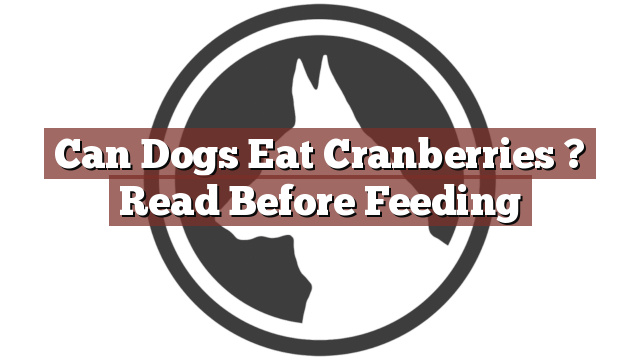Understanding Your Dog’s Dietary Needs
As a responsible pet owner, it is essential to understand your dog’s dietary needs. Providing a balanced and nutritious diet is crucial for their overall health and well-being. While dogs are primarily carnivores, they can benefit from certain fruits and vegetables as part of their diet. However, not all fruits and vegetables are safe for dogs to consume. It is important to be aware of which foods are safe and which ones can be harmful to your furry friend.
Can Dogs Eat Cranberries? Read Before Feeding
Can dogs eat cranberries? This is a common question among dog owners. The answer is yes, dogs can eat cranberries in moderation. Cranberries are not toxic to dogs and can offer some health benefits. However, it is important to note that cranberries should be fed to dogs in a specific way to ensure their safety and to maximize the potential benefits.
Pros and Cons of Feeding Cranberries to Your Dog
Feeding cranberries to your dog can have several benefits. Cranberries are rich in vitamins C, E, and K, as well as dietary fiber. These nutrients can support your dog’s immune system, promote healthy digestion, and contribute to overall well-being. Cranberries also contain antioxidants that can help prevent cellular damage and reduce the risk of certain diseases.
However, it is essential to feed cranberries to your dog in moderation and to prepare them properly. Raw cranberries can be difficult for dogs to digest and may cause stomach upset. It is recommended to cook or puree cranberries before giving them to your dog. Additionally, cranberries should be fed as a treat or added in small amounts to your dog’s regular food. Too many cranberries can lead to an upset stomach or diarrhea due to their high fiber content.
Conclusion: Making an Informed Decision for Your Dog’s Health
In conclusion, when it comes to the question "Can dogs eat cranberries?", the answer is yes. Cranberries can be a healthy addition to your dog’s diet when fed in moderation and prepared properly. They offer vitamins, dietary fiber, and antioxidants that can benefit your dog’s overall health. However, it is important to consult with your veterinarian before introducing cranberries or any new food into your dog’s diet. Your vet can provide personalized advice based on your dog’s specific dietary needs and health condition. By making informed decisions about your dog’s diet, you can ensure their well-being and happiness for years to come.
Thank you for taking the time to read through our exploration of [page_title]. As every dog lover knows, our furry friends have unique dietary needs and responses, often varying from one canine to another. This is why it's paramount to approach any changes in their diet with caution and knowledge.
Before introducing any new treats or making alterations to your dog's diet based on our insights, it's crucial to consult with a veterinarian about [page_title]. Their expertise ensures that the choices you make are well-suited to your particular pet's health and well-being.
Even seemingly harmless foods can sometimes lead to allergic reactions or digestive issues, which is why monitoring your dog after introducing any new food item is essential.
The content provided here on [page_title] is crafted with care, thorough research, and a genuine love for dogs. Nevertheless, it serves as a general guideline and should not be considered a substitute for professional veterinary advice.
Always prioritize the expert insights of your veterinarian, and remember that the health and happiness of your furry companion come first.
May your journey with your pet continue to be filled with joy, love, and safe culinary adventures. Happy reading, and even happier snacking for your canine friend!

